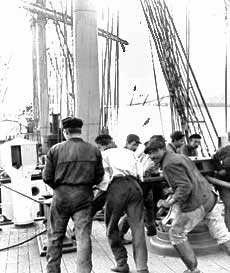Welcome
Submitted by admin on Tue, 01/02/2007 - 2:51pm.
No man will be a sailor who has contrivance enough to get himself into jail; for being in a ship is being in jail with the chance of being drowned…A man in a jail has more room, better food, and commonly better company. —Samuel Johnson 1759 (Boswell’s Life of Johnson)
The early 1700s saw the explosion of global trade through sail power. Sail was the supreme new technology of the period, making possible international mercantilism, the creation of empire, and the accumulation of wealth necessary to launch industrialism. As peasants were driven off the soil creating a new class of wage laborers, sailing ships gathered the dispossessed and unemployed and organized them under an authoritarian hierarchy that was the prototype of the industrial factory. Today, most maritime workers still experience comparatively rigid authoritarian power structures when at sea.Some of the questions that motivate this program are:
• What is the history of maritime labor conditions and how has it shaped work on the water today?
• How have maritime labor conditions historically reflected the larger structural power relations of class, race, and gender?
• What was the role of the technology of long-distance sail in the development of capital including the global trade that instigated exploration and exploitation in the Pacific Northwest?
• What is YOUR role as an individual within an interdependent community of workers?
To find answers to these questions, we will draw heavily from the disciplines of literature, Pacific Northwest history, and the social sciences. We will study the history of maritime labor conditions through historical, personal, and literary narratives. We will visit contemporary communities focused on the maritime trades such as Tacoma and Port Townsend. We will serve aboard the tall ships Lady Washington and Hawaiian Chieftain for two weeks in order to experience maritime work where crowded conditions, lack of comfort and loss of independence will be balanced with the opportunity to master basic seamanship skills, share our knowledge and excitement with visitors, and discover our role within a maritime community. Using analytical methods from the field of cultural studies, systems thinking, current ideas in organizational behavior, and the personal experience of our maritime work, students will finish this program with self-reflective work leading to a strong appreciation for the complex, dynamic power of working in a group.
Students should expect to commit significant time to reading, writing, and discussing academically challenging material throughout the program, including during the expedition.
Crucial to your success this quarter will be your development of significant individual goals
to be reached through your own independent curiosity and scholarship within the context of our learning community.
***This is a drug and alcohol free program***

